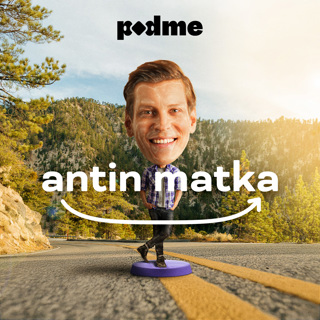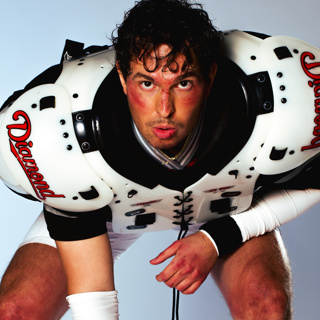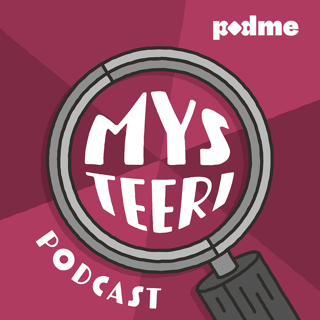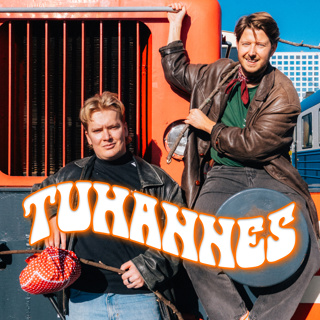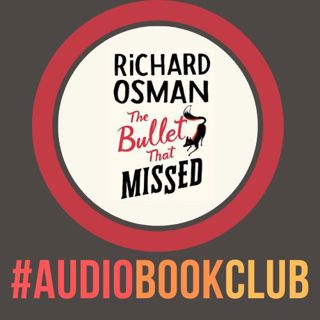
'The Bullet That Missed' - by Richard Osman
Steve Phillips and Matthew Layton present #AudioBookClub - a podcast that recommends and reviews audiobooks. On this episode: 'The Bullet That Missed' Book 3 of Richard Osman's Thursday Murder Club series of whodunnits set in idyllic retirement village Coopers Chase. For people (like Matthew) who have read the first two books in the series, it's the eagerly awaited return of beloved characters Joyce, Elizabeth, Ron and Ibrahim. For people (like Steve) who are new to the seriesm it's a chance to follow the adventures of a group of senior citizens who have taken to solving murders. Society may have cast them aside, but they are fully rounded human beings with a wealth of experience. In our role as one of the world's very few audiobook review and recommendation podcasts, we feel it is our duty to bring up the issue that nobody else is talking about - to mention the elephant in the room: Changing a narrator? Three books into an audiobook series? Is that even legal? Please get involved in the conversation - either with your opinions on 'The Bullet That Missed' or if you want to recommend an audiobook for us to review by using #AudioBookClub on facebook, twitter or instagram. – Coming up on AudioBookClub… 'Colditz: Prisoners of the Castle' by Ben MacIntyre - https://amzn.to/3EiofUR From the Oasthouse: The Alan Partridge Podcast (Series 2) - https://amzn.to/3yia0vA
5 Loka 202237min

'The Hepatitis Bathtub' - by NOFX
On the latest episode of #AudioBookClub - the audiobook review and recommendation podcast - Steve and Matthew leave their comfort zone to discuss possibly the most punk audiobook of all time. 'NOFX: The Hepatitis Bathtub'' by NOFX and Jeff Alulis is a collection of autobiographical vignettes from L.A. punk band NOFX. When we say 'vignettes' we mean 'often disturbing and even disgusting stories' Steve and Matthew are joined by 'friend of the show' Shane Kendall who is responsible for recommending that we listen to this particular audiobook. TRANSCRIPT Matthew Layton: On this episode of Audiobook Club, possibly the most punk audiobook of all time. Steve Phillips: On the least punk podcast of all time, this is audible. Hachette Audio presents no fx, the Hepatitis Bathtub and Other Stories, written by no fx, with Jeff Alulis, Redbox no fx, Fat Mike Burkett, Eric Melvin, Eric Smelly Sandin, and Aaron El Jefe Abeda, with special guests Jello Biafra and Tommy Ch. Matthew Layton: Mike, we're rolling. Shane Kendall: Oh, s***. Matthew Layton: Chapter one, Mike. The first time I drank p*** was on a fire escape overlooking downtown Los Angeles. Steve Phillips: Hello, I'm Steve Phillips, and welcome to another episode of Audiobook Club, a podcast about audiobooks that refreshes the parts that other podcasts cannot reach. On this episode, we'll be chewing on no fx, the Hepatitis Bathtub and Other Stories, a collection of vivid, often alarming autobiographical stories from American punk band nofx. Joining me down the line from Adelaide in Australia, it's Matt Layton. Hello, Matt. Matthew Layton: Hello, Steve. Did you enjoy this week's book? Steve Phillips: I'm still having nightmares. Also on the line from Australia. I mean, we have to bring in our guests now to explain the nightmare slash, you know, excellent audiobook. Also on the line from a totally different part of Australia is the man who suggested that we should consume this particular audiobook. It's pal of the podcast, Shane Kendall. I'm not saying what you read in that script here. I'm not saying friend of the show. I'm so. Hello, Shane. How are you? Shane Kendall: I am well, thank you very much. And I'm glad one of you is happy to have me because, well, Steve, I thought that your reaction to the idea of me joining was a little. I don't know, you didn't seem all that keen. If I remember it correctly, Matthew said, hey, we're doing this thing. That's. That's kind of a surprise. And your reaction was, oh, what? And then Matthew said, oh, there's a guest. Who is it? Steve Phillips: I think I can explain this. Actually, we don't want to go. I feel like already we've got off on an odd footing. But if I could explain back last week's episode. Dear Listener, if you had heard it, I have a bugbear with the phrase friend of the show. It's something that gets used a lot on radio stations. Hey, friend of the show's coming in. And, you know, frankly, you can't be friend of an MP3 or a sound wave in my view. However, when Matt said, it's you, I just went, it's friend of the show. And he. Shane Kendall: That was A lovely welcome. I was joking. I'm teasing. Steve Phillips: Did Matt send you a special edit of the podcast? That's probably what it was. No, I wouldn't put it past him. So, Matt, so this is actually because we've done. We're doing a threesome for the first time here. How do we kick things off? Matthew Layton: I go first. So before. Before we ask Shane, what on earth were you doing choosing this audiobook? It's probably a good idea to establish what the audiobook is. And we'll do it in our usual order, where we talk about the author first, the book second, and then the performance and narration third. I've divided section two, what the book is about, into a number of subheadings that will be familiar to us and will help us along the way, will guide us in what we talk about. And those subheadings are sex, drugs, rock and roll, violence, no Money, and friendship. So no FX is a US punk band originally formed in Los Angeles in 1984. For a number of years, they didn't really trouble the music charts, as it were. I hadn't heard of them, but apparently when people think of the punk scene of the 1990s, the American punk scene, which featured bands like Green Day, the Offspring, and Bad Religion, apparently people consider that they are part of that genre, as it were. So this book is narrated by the band, each of the individual members, the chapters, as you just heard, will start with the member of the band announcing his name. Each chapter is about five to 10 minutes long and will tell a story from the perspective of that person. Now, obviously, these people are punk rockers, and their medium is generally chaos. So from what I can tell, the person who did the reining in of that chaos is a guy called Jeff Alulis. Now, Shane, you're our resident punk expert. Did you know that Jeff Alulis was Jeff Penalty, lead singer of the Dead Kennedys? Shane Kendall: No, I didn't know that, actually. That's. That's interesting. Matthew Layton: Well, so he's. He's the lead singer of the Dead Kennedys, but he's also. He bills himself as a writer and producer. Shane Kendall: I thought Jello Biafra was the singer of the Dead Kennedys. Do they have a different singer now or at some point? These are the questions that I'm sure this is not the. The podcast to be. To be answering. Matthew Layton: No, let's keep it punk. It doesn't matter. Steve Phillips: Who are the. Who are the Dead Kennedys? Matthew Layton: The Dead Kennedys. Steve Phillips: Mainstream. Matthew Layton: The Dead Kennedys are a punk band, and I believe the Dead Kennedys Is a referen. It means money, doesn't it? Because it's the reference to the dead presidents on one of the denominations of dollar bills. Shane Kendall: I didn't know that. Piece of trivia. I would have assumed it would just be more on the. Well, the Kennedy family's got a strange history, don't they? Matthew Layton: Yes, I think so. I could be wrong, but one thing I do know from my extensive research is that while he has incredible impeccable punk credentials, Jeff Alulis. Jeff Penalty also can claim to have represented the United States of America in the sport of fencing, specifically in the epee class. So the book is a series of stories. Sex and Drugs and Rock and Roll. The stories of the rock and roll dream, which sounds to me like a bit of a rock and roll nightmare. The opening chapter is somewhat challenging. We'll get to that in a minute. So the blurb on the book, the way the publisher tried to sell this book is by saying stories of murder, suicide, addiction, counterfeiting, riots, bondage, terminal illness, the Yakuza, and drinking pee. Now, if that's not a way to sell a book, I don't know what is. Steve Phillips: Lots of Barbara Karlan novels. Matthew Layton: Steve, you wanted to talk to Shane about his choice of book, didn't you? Steve Phillips: Yeah, I mean, I. I've never heard an audiobook like this ever. And so what? It was. So Chapter one was just so graphic. Full on. I mean, it was just. I thought 12 hours of this and I mean, I was disturbed. I mean, I was just driving my dog to the country park and, you know, through quite a nice, pretty little English village while listening to stories of. Well, I mean, I can't really go into. It involved milking anyway, which is a little bit sort of. It is connected to. Loosely connected to the countryside and rural life. But it was what was being milked at the time that was. Anyway, cut to the chase. Matthew Layton: We are certainly out of our comfort zone, aren't we, Steve? So normally, basically, what we have on here is sometimes we do biographies, sometimes we do a bit of history. If we're feeling daring, we may go and do a little bit of science fiction. And this book, again, just to remind you, is literally called the Hepatitis Bathtub and Other Stories. It's not our usual fare, is it, Steve? Steve Phillips: It's. I mean, it's brilliant. I mean, I like being. You know, it's quite liberating, actually, to suddenly just let rip. Let's just tear this podcast up and just stick some certain type of milking stories on it. I really. I'm Terribly. I'm still terribly BBC about this and I can't say actually what happened. We'll have to stick an E on this podcast and not that sort either. So. Yeah, so Shane, guess I'll just drag us back here. So Shane, tell us what made you, what made you choose this audience? Hang in there. Come on, we gotta drag this s*** back. Matthew Layton: Put your BBC hat on, Steve. Steve Phillips: Ship with a P By the way, I didn't swear. Right, okay. So Shane, it's an interesting tome. What made you choose this particular book? Matthew Layton: What does it say about it, You Shane, that you chose this book? Steve Phillips: I want Shane to come on every week. Can Shane be on every week? Shane Kendall: This is brilliant. It's much better. Steve Phillips: Where have you been on Our Lives? Shane Kendall: Shane, have we finished asking the question? Matthew Layton: Yeah, nearly. Steve Phillips: So going down the Jeremy Paxman route. So Shane, tell us. Matthew Layton: Punk rock. Who needs to ask the question properly? Steve Phillips: We can do what we want, can't we? So Shane, tell us what was it that interested you about this book? Shane Kendall: Now I've been asked a similar question three times so I'll try and answer them all. First of all, this is the only audiobook I've ever listened to so when it came to do you have a book to suggest it's like well I've actually only got one and just to asterisk that I wouldn't necessarily recommend this as something to listen to. So what drew me to it is maybe a longer answer which is I'm a fan of. I'm a fan of music and particularly punk. That's my favourite genre and I also am a little bit of a historian as well. I like diving deep into the things I love and I'm not a huge no Effects fan. I like them but I'm not a big fan who's like wow, they made a book. I must go out and read it and. Or listen to it and things like that. I was just told I got the recommendation of yeah, you should listen to this not because of its vulgarity or low brow humour but because of what it says about the punk scene at the time and even just west coast American culture at the time. So it was the historian part of me is what made me really want to consume this book and I reacted well, I kind of. I knew what I was in for a little bit but my reaction was much the same as you two of especially that first chapter. That opening line is you never think you'd hear something like that but anyway that's what got me listening to that just it was a recommendation from another person and here I am spreading it around. Matthew Layton: So it's not a deep insight into your soul and your inner demons and your personality or indeed the code by which you live your life, then I'm. Shane Kendall: Definitely the kind of person who enjoys these kind of things from a safe and comfortable distance. Steve Phillips: Especially the milking. Shane Kendall: Well, some things, some things I like to get a bit hands on with. But the good thing about this book, and I know we'll get to the more review of it later, but there are actually a lot of parts in it that I do resonate with and connect with. So yeah, not necessarily the milking and drinking pee, but certainly having to Once upon a time being a young man navigating the music industry and the struggles that come with that. My struggles were nowhere near the kind of things described in this book. But yeah, there is a lot of it that I do align with. Matthew Layton: Okay, well, let's take the music so I hadn't heard of no FX before I started reading this book. I was aware of the Green Day led resurgence in punk that happened in the 1990s. Punk obviously originally started in the 1970s in the UK and the ethos of punk was nothing matters, destroy everything. To a certain extent, the Sex Pistols Anarchy in the UK album claimed to be doing that. Short, sharp, loud songs, playing your instruments properly was not necessary. Musical dexterity was not necessarily the number one priority. And I think that no effects in this band if we start in the wrong place on the rock and roll. I think by their own admission they weren't a very good band in terms of musicianship. They weren't very professional. They almost missed the fashion, didn't they? They said so they were a band for a long time, touring in a van that basically it was as much about the fights and the drugs and the getting laid for the first time as much as anything else. Is that a fair assessment, Shane? Shane Kendall: Well, there's a few things one, punk started in the uk. I don't know about that, but this isn't the podcast. Matthew Layton: Here's a few, here's a few things that you've just got wrong. Everything you just said, okay, they're not fair facts, Shane. They're points of discussion. Please tear me apart. Shane Kendall: I think you said something that I was only thinking about last night, which is, as you said at the beginning, the band formed, I think it was 1984. It took them, in my opinion, almost 10 years. It wasn't until their album, I won't say the title because I think it's a little politically Incorrect or racist. That came out in 1992 where I. I think that's a band who can actually kind of perform and play. So it took them almost a decade to get good. So yeah, it was definitely, I think, about just being part of a scene that the term that gets used is disaffected youth. I'm not sure how I feel about that, but it paints the picture. And being part of a community and all of the things that came along with it attracted some people more than others, I guess, all of the chaos and recklessness. So it was about attitude rather than musicianship. Definitely. Matthew Layton: Can I play you a couple of little clips? So the first one, I think my favourite member of the band and I think the heart of this book. As much as Fat Mike is the lead singer, I think the drummer who goes by the handle of Smelly is the heart of this book. And I want to come back to him a bit later on, but this is how he felt about the band. Matthew Layton: I don't know if I've properly underscored just how bad Mike and Melvin were at their instruments at the time, but they were seriously awful. Being s*** faced didn't enhance Mike's abilities. And Melvin trying to mask his shyness by monkeying with his amp and rarely facing the audience did not help his performance. Even if we had written the best songs in the world, we still would have sounded like s***. We had not written the best songs in the world. Somewhere in the middle of the second song I realised what a horrible band we were. The crowd just stared at us blankly as we embarrassed ourselves for six back to back songs. Matthew Layton: He then goes on to say that, you know, everybody in a band thinks they're good. But let me tell you, the opposite of love is not hate. The opposite of love is indifference. That nobody cared. In fact, if people had started punching each other in the head or booing or throwing bottles at the stage, they probably would have been happier. But the bit that I'm. I think I would point out here is that it's not necessarily the music wasn't the number one on. Or being a professional musician wasn't necessarily the top of the list of priorities. Here's the follow up to that little clip. Matthew Layton: Every instinct I had should have pushed me away from no Effects. But inexplicably I stayed with them. We were having fun. It was music I liked. And guys my own age. I told Costa cause I was leaving to play with my new band. They didn't make much fuss. Punk bands weren't building careers back then. So they didn't see any tragedy that they were losing a drummer. And I didn't see it as a bad financial move to start working with an untalented new band with zero reputation. I just wanted to play loud, fast music with my buddies and occasionally ride their skateboards. Matthew Layton: It's about skateboards and being with your buddies, Shane. Shane Kendall: Sure. What could be better? Basically, I discovered punk. Exactly. Being out on skateboards with my friends and my older brother. And that was the soundtrack to my youth. And it still is. It keeps me youthful. Matthew Layton: Should we bring in Steve? Steve Phillips: I've been looking at something that we need to have a discussion about in the notes from the margin bit on this audiobook. And, Shane, I don't know if you. How did you consume this audiobook? Was it. Was it download Audible? Did you get it from CD, like, years ago, or. Shane Kendall: I got it on CD whenever it came out. Matthew Layton: 2016. Shane Kendall: Okay, good. I thought it was around then, but I wasn't sure. I got the book, which I haven't touched the book, but I did get the CDs, but I recently. So just to recap for this very podcast, I listened to it on Audible, so that was my first Audible experience as well. Steve Phillips: Excellent. Shane Kendall: It was. Steve Phillips: All right. The reason I ask is because. Have you seen the accompanying PDF that comes with it? Shane Kendall: No, I don't think I have. Steve Phillips: I found a couple of things on the accompanying PDF I want to share with you both now. And for me, this really encapsulates the book. You had the really hardcore chapter one. The reader smacked you in the face and just said, careful. I don't know whether it's deliberate. Sort of say, we'll get them with this. And if they. If they're good enough readers, it's like the readers being tested. If the reader has faith in what we do, then we'll carry on listening. Because actually, after chapter one, there's some really heartfelt stories in there. Some genuinely, you know, some, you know, they had. So they cut. These guys had, you know, tough upbringings and tough lives, and that really came through. But what I wanted to share with you is a couple of postcards sent by Fat Mike, as he titles himself, by the way, to his mom. So they send postcards to each other, of course, because that's how you got in touch with people. And this really encapsulates it. And just let me see if you agree. This is probably the first time you might be hearing this. I'm guessing both of you. Hi, Mom, I'm in Hamburg. There are hookers everywhere. Beautiful too. Only 30 bucks. Please send more money. Just kidding, just kidding. Everything going great. I'm eating lots of good food. They feed us vegetarian food but it's all good. Well, I must get back to the Reaper barn until. Oh, can we say Reaper barn because that sounds a little. Matthew Layton: Yeah, yeah we can. It's. It's the. So as somebody who used to live in Hamburg I can tell you that it is. It's a port town and that that is where you will find the. The red light district, the ladies of the night. It's also where all of the clubs are. So when you hear about the Beatles living in Hamburg, they were playing I think in the marked Hallet with the market hall. I could be wrong on that one. And they. So. So in the basement of that club. So yes, it's a port town. People getting off ships after six months at sea would come in and want to party. And even when I was a kid I did a German exchange trip where I went and stayed with a nice middle class family. But even they. They sort of. They're happy to show you with pride this centre of the particular industry in Hamburg. So that's a very cool postcard. Shane Kendall: Sounds like the kind of postcard I'd send to my wife. Steve Phillips: Lots of hookers. Please send more money. Yeah, cuts right to the chase that I was gonna say. Matt. Yeah. Just to tag on. You were slightly missing because that was a beautiful description there of the life and staying in Hamburg. What you slightly missed at the end was you can get seven nights in Hamburg for half board from £439 visit beautiful Hamburg. The second postcard. I'll just do the second one and it's just two postcards. But again it's from Mike to his mom and this time it looks like they're in Italy because he says the ma. I finally got a goal in life. I want to be Pope. I am now celibate. I'm dedicating my life to God. I'm going to convince Erin to be a nun. We're going to live together in a church and raise chickens. You can visit me on Sundays. Bye and God bless you. Matthew Layton: That's absolutely lovely. Steve Phillips: Yeah, it's good, isn't it? But these things have really good. To be honest, this is what I quite liked about it. There's a real sense of endearingness coming through all the rock and roll. There's a rapport with the. With the, you know, the main protagonist. I sound so un punked when I say that the main protagonist. Matthew Layton: I think that's part of the point. You nearly walked away at the end of the first chapter, didn't you, Steve? Steve Phillips: Yeah, I was at a crossroads after being disturbed and I think my dog was disturbed as well. Like sounds driving her to the country park. But then chapter two kicked in and I can't. Which band member? It was off top of my head, but. But the story he told about his. His family, his mom, his dad, his upbringing. Yeah, it just makes you. It just make you start. It was completely the opposite to chapter one. And I think you kind of want to be where it's deliberate. Matthew Layton: Yes, Melly the. The drummer. And yeah, was chapter two. And then Mel Smelly the drummer. Smelly the drummer. And then both of them called Eric. So there's Eric Smellie and Eric Melvin. He tells quite a disturbing story in chapter three, which involves an unpleasant incident in his youth. And at that point, that's when I started to become hooked as well. The book does have a heart and I want to get onto that heart in a second. But in order to get there, I think the heart, as you know, the heart of the book is. Is when Smellie realises that perhaps he's lost control of his life. At one point, they say that beer is easier to get hold of on the road with a punk band than water. And beer is just the beginning of it. There are lots of drug. I learned some new things about drugs. Apparently cigarettes soaked in PCP don't have a very pleasant effect on you. Cocaine has certain effects. There's one point where Smelly says, you know, after the PCP cigarette, I decided to give up drugs for a while. Apart from LSD and mushrooms and obviously lots and lots of weed. And it gets to the point where the drug taking affects the band. Not only their playing, but also their relationships with each other. They're all quite bad at it. But then Smelly goes into rehab and I think for me that's where the heart of. It's about chapter 90. But for me, it's the heart of the book. Shane Kendall: Yes, Smelly is. He's kind of the hero of the story. And what I've found interesting, listening to it the second time through is how much I relate to him more than I did before. But because of that, I was thinking about other books that I'd read and my wife had read. And Smelly Story really could be a standalone book, but it would just be one of those miserable kind of life. But I pulled myself together with that kind of calligraphy font, you know, that font that all those books have his Story alone is good, but I think it needed everything else around it to really shine. Matthew Layton: We naturally then come to our talk about the narration, slash performance of the book. And as we've already mentioned, each of the band members reads their parts of the memory. There are a couple of other people who come in and read the parts of band members who couldn't do it. One of them has passed away. So Dave, the temporary lead singer, I think it was Shane, you and I were talking about this book 10 days ago as we were both listening to it, and we go, I wonder what happened to Dave. When I listened to the second time, he dies. And Dave dies in a car crash. And there is a lot of. This is the difficult thing about it. There's a lot of death in the book. A lot of people die young in this book. So Chong out of Cheech and Chong reads the part of their temporary lead singer, Dave, and I think you're right, Shane. I think on its own, one of these stories wouldn't be enough. When you first read the book, it's a little bit overwhelming. I think actually, if I'd been able to listen to this podcast, I would probably have gone in with a little bit more of an idea of who the characters are and what they're doing. Fat Mike is the lead singer. He's somewhat obnoxious. He's. We've heard one fart joke from him already. By the end of the first chapter, he has a mohawk. And he's the person you want a frontman to be. The shouty, loud person. On stage, Eric Melvin is a little more mild mannered, a little bit mellow in his voice. There is this sort of stoner personality a little bit. And then smelly, as you say, I like the way that you. I thought I was putting my neck on the line saying that that smelly was the heart of the book. I'm really glad that you see him as the lead character or the heart of the book as well. And the interesting thing is that all of these different perspectives, all of them are engaging and not necessarily in the way that you would think that they are more relatable human beings than watching a 2 1/2 minute performance of one of their songs, which would, would give you, you know, they're not just people with, you know, mohawks and the long shorts, the white socks and the black shoes of 90s punk rockers. They are really, they're human beings. These, this is how to meet the human beings behind the, the, the band on stage. And I think there are certain things where it's like reading the Bible, there are four different versions of the same story and you see each of the ban own perspective. So I would say not only is the performance, in fact the. The performance is engaging. I would say that each of the band members as individuals are engaging. I think you're right to think of it, Shane, as. Yeah, let's imagine if it were only one of those stories, would it be as good a book? And I don't think it is. It is somewhat overwhelming if you come to it cold. If you come to it like I did, never having heard of no Effects, you can get a little bit lost partly because the subject matter is so overwhelming. But I ended up liking Eric, loving, Smelly and tolerating Fat Mike. Is that fair? Shane Kendall: I think that's the general consensus, yes. Within. Just outside of the book, just in the music scene in general, I think that's generally how the band is viewed. Well, El Jefe is kind of the comedian of the group. He's probably. He's probably the one you'd want to be friends with. Matthew Layton: Yeah, I think so. I like the way I think again, the band would not have lasted as long if it weren't for. From what I can gather, the interplay on stage between Fat Mike and Jefe and the humour. Humour is mentioned a lot and it's interesting. Again, I haven't seen it, but Mike says that whenever these days he's playing golf with somebody and wants to tell them about the band, he refers them to their reality television series which again pushes the musicianship down another step, doesn't it? In terms of. It puts it slightly. It gives it even, even less priority, puts it slightly more in the background. Shane Kendall: Backstage Passport was the name of the reality TV series and if somehow you've listened to this book and thought, wow, I want more of that, that's a really good next step because it takes place, I think it begins kind of at the end of where this book, the timeline of this book. So it's. It's almost a continuation from this. So it's. It catches you up to where they're up to now, which is. Well, not a lot has changed really. Matthew Layton: So the reality television show, again, it's yet another thing Pushing the music priority to the back was they said they wanted to tour and go to glamorous places like Texas and Idaho and then apparently it's a concert in Iceland where they get a real taste for the travel bug and decide to make this Backstage Passport series, which again, I hadn't seen and I came to that knowing I'm not sure I do want to go and spend more time with them just yet. I very much enjoyed my time with Nerfax but I think I want to possibly go back and do an Agatha Christie next week or a Barbara Carlin. Shane Kendall: That's fair enough. Matthew Layton: I get it the rehab story I think again without this book it would just be irritating if, if someone, and as you say, our hero the drummer Smelly hadn't been I hate that use of the word journey but if he hadn't, after several failed attempts booked himself into what basically sounds like a labour camp come rehab centre in the desert in California and worked very hard to pull his life back together and then deal with being on the road with a punk band after that without that this story wouldn't be as good as it is. Would you agree with that Shane? Shane Kendall: Definitely. That's exactly what I was talking about earlier when I said this time round I really resonated with Smelly because I think towards the end of the book would be there probably around the age I am now maybe, you know, starting Yeah I think 2010 ish and onwards but what I took from it this time around was you have a person who's gone through all of his struggles and done everything he could to not let that interrupt his career and his friend's career and he went through and he got clean but he was in a situation where, and I think it's very typical of the entertainment industry where he was the person who had to grow up amongst a whole crowd of people his closest friends who never grew up because what they'd been doing since they were, you know, teenagers that's just what their lives were and now they're in their mid-30s and still doing that stuff and he's, he's the adult now and you know, that, that really resonated with me because as I said, being younger and being in bands I, I understand that that young, the, the young fun part of it but I don't, I don't want to do that now. There's a time and place for everything and your mid-30s and 40s, isn't it? And the other reason it resonated with me is unfortunately I still see within my personal life I see exactly his perspective of trying to live, you know, a good life but just some of the things that happen around you, you just think I, I thought I'd, I thought I'd gotten away from this but it's just, it's, it's always there. Matthew Layton: I thought I dealt with this. But life can still smack you around the head, Is that what you mean? Shane Kendall: Yeah, pretty much. And just, you know, the. The people that you. You meet along the way, that, you know, some of them linger and they've got the same things going on that were happening when they were teenagers. And I just think it's, you know. Matthew Layton: There'S almost a bit where both Mike and Smelly are trapped. And so. So Mike apparently did not start using cocaine until he was in his 30s. And as smelly cleaned up, his use of drugs became. He got worse, basically. And to the extent that at one point after a gig in, I think it was Rochester, New York or somewhere like that, there's one particular gig that they all remember where Mike was doing cocaine off the amp on stage. And Smelly reached a point where he said, I can't take this anymore, and actually wrote a letter to his band members and called the first band meeting that had happened in 15 years. And there's a bit where Smelly's trapped in the band full of children, but also Fat Mike is stuck wanting to be Sid Vicious. And as Smelly puts it, there's a reason that you think you have to be Sid Vicious is because Sid Vicious is dead because he did too much of it. So there's almost a bit where, yeah, they're locked into being a touring band and, you know, the punk pose, as it were, and they. They're stuck in it and they can't get out of it. Shane Kendall: I think something that maybe is an underlying text amongst it all is. And not that we want to necessarily turn this into a therapy session, but I think a lot of what Mike says at the end about how, you know, he was emotionally cut off until he had his daughter, I think that all kind of started happening around the same time. I just wonder if Mike's dependency on substances really came from a life of not coping. And that was his way of doing what he needs to do, which is get up on stage and pretend he's happy. Matthew Layton: And they said that, you know, he's really good at keeping it clean when he was at home with his daughter. But that meant that he went off the rails more when he was on the road and on tour. Also, there are. They deal later in the book with the death of their parents and in Jefe's case, the death of his brother as well. So there is, yeah, the bright spark of punk. Unfortunately, life goes on after that. Two and a half minutes of thrashing around, banging heads with other people in a mosh pit. Shane Kendall: I have to Confess. The last two hours of the book I haven't listened to because I know what's there and I'm not in a place to deal with that myself. Like it's that it gets real rough at the end with all of that. In some ways I wish I was a little more emotionally closed off, I guess. Matthew Layton: Okay, well, so we started this off going. This is a thing about punk. It's about sex, drugs, rock and roll, violence. We didn't mention too much of the violence and the whole idea that this is punk. But there are a couple of bits in the book that I find problematic and I actually found myself going, should we be condoning this book? There are a couple of incidents. The first one is quite a violent incident at the beginning where LA's punk scene was notoriously the only one in the world where there are actual gangs of rival punks. And at one point the guys witness a girl being carried off into a dark alleyway by a bunch of punk gang members who part of their uniform was to put the sort of the camouflage paint on their faces. So people have been really scary. She was being carried off and she asked their help and they stood by and couldn't help them. And then of course there is Raymond, described as a white Mike Tyson. There's a bit who basically there was rumours that he'd murdered people. He spent most of his adult life in prison for rape. He was Smellie's best mate. As this was going on, there are bits of me, Shane, that were uncomfortable bringing this book on the podcast. Not for the milking of other human beings and how that's inappropriate and not suitable for a family audience, but actually that seriously, there were some bad things that happened that. Yeah, as I say, I wasn't necessarily at the time, on the first time I read it, comfortable bringing this onto the podcast as something to recommend because of those serious bits. Shane Kendall: I remember in an email with you saying now that I've started listening to it again. So I'm not sure, maybe there needs to be a. Some kind of censorship warning for this podcast episode. I don't, I didn't remember it being quite so. Yeah, there's like the more, well, maybe not funny but low brow parts, but then there are those just really awful themes that we don't want to be exposed to for fun. Steve Phillips: There's the argument, I guess, to say this was holding up a mirror to how things were back then in that particular culture that, you know, maybe it's good to actually shine a light on it. These horrible things happened and you can't really escape that, can you? Matthew Layton: Yeah, well, the word that's in there that we've mentioned already is rehab, isn't it? Which is short for rehabilitation. So as I say, I was uncomfortable that there were bits where there were the characters who was meant to, like in this book, did things that seriously are not. So as much as the headline of this is we're making jokes about milking, there were parts of the book where I said to myself, I mean, we've always been taught, Steve, in the old broadcasting place where we used to work, that, that you cannot condone drug abuse, you cannot condone crime. And I just like you, my broadcast professional instincts aren't as finely honed as yours, but there was a little bit of discomfort there from me that yes, as much as this is an uncomfortable read because of the graphic descriptions of Fat Mike's sexual proclivities, that that was inappropriate. But again, I thought there was another level, which is the reality of it. But yeah, it makes for a richer story. I have to say that the milking of other human beings is not the thing that makes me uncomfortable about recommending this book. It's some of those darker elements. Although on the second time of reading it, I felt a little more comfortable once I knew them better and had a better grasp of their situations and their characters as human beings. Steve Phillips: It's the context, isn't it? It's the backdrop to their. Their characters are in and which kind of makes you bond with them a little bit more. So not this is very generic thing, like maybe not all of them, but there are some people with good hearts in their mistakes were made certainly. But. But in terms of the issues, in terms of thing and shining, going back to sort of shining a light, there are things that. And actually talking about, you know, our old BBC days, Matt, you know, in terms of drug abuse, that was on Grange Hill. That was a Grange Hill, by the way, Shane is a kid. It was a kid show in the sort of the 70s and 80s. It was a kids show about school and there was one character and they called Zamo, who was. Who fell into substance abuse with heroin. And that was at 5 o' clock on an afternoon. Matthew Layton: Yeah. Kids of our age know who Zamo is. You and I possibly haven't done heroin partly because of the influence of Zamo. But at no point did Zamo enjoy his drugs and see it as part of his job. Steve Phillips: No, he didn't. Matthew Layton: No. Steve Phillips: Of course, his job as a school child. Yeah. Matthew Layton: So what we really have to ask Steve Is. Is what does Shane bringing this book to the table say about Shane? Steve Phillips: Yeah, that's a crux. That's what we've been building up to for the last, you know, goodness knows how long. Matthew Layton: Can I just say, like. Like. Like the guy who brought the book together, Jeff Alulis, who fenced for the United States Fencing Team. I would like to point out that the other day Shane was talking to me about his second favourite venue for high tea and he's notorious for wearing ties to Zoom meetings. So, yeah. Shane, any other business? Was there anything else that jumped out of the books that you wanted to tug our sleeves on? Shane Kendall: I'm not sure. I don't know what that term means. Matthew Layton: When you're grabbing somebody's attention, you tug their sleeve. If you're a small child, you tug the sleeve of somebody to get their attention. Shane Kendall: How does this book not raise enough attention for, like, what. What's. What is there? That. Actually there's one thing that I will say about it and Mike says it kind of at the end he makes a little joke about his lawyer. The thing that I found fascinating is after the book was released they did a press conference where they said they were. I think it was two stories that they could not put in the book. Their lawyer said, that's. You just can't put that in. How do you go through. How do you read or listen to this with everything in it and just know that there's still two things that were explicitly said? You can't put that in there. Matthew Layton: Yeah. There's also a bit where they say stories they don't dare to tell. And again, that makes me worry a little bit. I mean, I'm not saying this is like Taylor Swift's airbrushed documentary of what her life is really like, but there is always a certain amount of presentation in these things. And yeah, just there is a slight nagging concern is, I wonder what those things are. Are they related to crime? But I think I just want to be. I'm very shallow, Shane. I think I just want to be seen to be saying these things rather than actually being genuinely concerned about it. I think the book, the Expression War Thoughts and All comes comes to mind. And yeah, I mean, this book isn't necessarily one you would give to your granny for Christmas, but I don't think that means unless your granny is. Is Fat Mike's mum. But I would recommend this to other people on the proviso that the warnings that we have given the flags, that we have run up the flag poll that we have made those points clear. Is that fair? Steve Phillips: There's a sentence you can say here which is. Listeners may find some scenes upsetting. Matthew Layton: Yes. Steve Phillips: And yeah, some, some listeners may find most of this book upsetting. I think it's probably the key thing here. And actually I mean that very seriously because I think. Yeah, you can't, you know, you have to be a. So I think you have to be. There has to be like an eight. I mean, actually it's a good. This is a good. Another notes from the margin piece here, Matt, is should there be age ratings for books? There you go. For movies, you got them for video games, haven't you, Peggy? Matthew Layton: 80, you do. Steve Phillips: But. Matthew Layton: Yeah, no but for books or audiobooks, that's a really interesting point. I'm looking at a bookshelf at the moment as I speak to you and none of the books have ratings on them. But I suppose this is more. Yeah, it goes from print media to broadcast media effectively, doesn't it? I mean the answer shelf. The answer could be that in order to buy yourself an audible podcast, you've got to have a credit card. There you go. That's how I'm going to get out of that one. So you have to be 18 years old. Steve Phillips: There you go. Okay, nice. I'd say, I'd say you have to be 40 years old before you can listen to this. Matthew Layton: It is interesting and I've said this before. I made this. We have gone out of our comfort zones on this week's show, but strangely, as much as we tried to step away from what we do best, we ended up in the company of some white middle aged men. Shane Kendall: Jefe's. I can't remember where he was from. Mexico. Matthew Layton: Yeah, Jefe spelt with an H because his Spanish is so bad he doesn't realise that Jefe begins with a J, so he's not that Mexican. I think my point stands. Mr. Chairman. Mr. Chairman. Steve Phillips: That's you, Steve, is it? I thought you were the chairman. Matthew Layton: Yeah, we're on 51 minutes, Steve. Steve Phillips: Okay. Yeah, we also wrap things up. Okay, I've lost the script now. We've been getting so engrossed in the, the moral dilemma, the moral maze of this book. Shane, thank you for your time today. This book has been a true experience to the ears and there's been some amazing stories in there as well as everything. All the serious stuff we've been, we've been covering as well. So Shane, thanks so much and come along again. Read a second audiobook and, and come and join us again. Tell us what you thought of it. But if our listener wants to play along, Matt, what should they be reading next time? Matthew Layton: Next time? Well, in fact, as we record the. The latest in Richard Osmond's series of murder mysteries has been released. The Bullet that Missed these things are actually set in an old people's home and a bunch of retired people go about solving murders. So right back into the comfort, into our comfort zone. The. Steve Phillips: Lay back to a Richard Osmond. Lovely. Matthew Layton: And then the. The week after that. I don't know, Steve. I want to learn something. Having gone from punk rock to back to our comfort zone, I want to perhaps take suggestions from a gentle listener. I've written down history or science or maybe history of science. I don't know. I just feel like I need. I need to be bettered after this week. Steve Phillips: Science of history. Yeah, yeah. That is a thing. Matthew Layton: So we'll take. We'll take suggestions for the week after next. Steve Phillips: Okay, that sounds good. If you want to suggest a historical or scientific tome for us to listen to, then it's the hashtag audiobookclub on all the social media channels. Just get in touch with us. We are audiobookshow on Twitter. We've got a Facebook page as well. Just search us out there and put your suggestions in for something we should be listening to for week after next. That's with something historical or scientific. Once again, Shane, thanks for your time there. You'll come back, won't you? Shane Kendall: Absolutely. And rather than me being left to my own devices and finding another book to listen to, I would. I think we should plan it. And it certainly should not be trusted to recommend any more books. Matthew Layton: No. Steve Phillips: Welcome back anytime, Shane. Friend of the show. So that was no Effects, the Hepatitis Bathtub and other stories by no Effects and Jeff Alulis narrated by no Effects, Jello Biafra and Tommy chong. Comes at 12 hours, 31 minutes, is unabridged and was released back, as you say, August 2016. That was audiobook club for this week. We'll stick a knee on this one, I think, and we'll see you again next time. Cheers, Matt. Matthew Layton: Cheers, Steve.
28 Syys 202250min
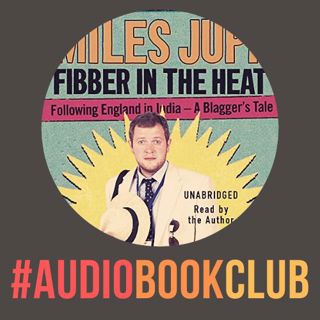
'Fibber in the Heat' - by Miles Jupp
On this episode of #AudioBookClub Steve and Matt consume 'Fibber in the Heat' by Miles Jupp - an autobiographical memoir of the actor/comedian/author's attempt to blag his way into becoming a cricket journalist. In 'Notes from the Margin', we'll be asking 'How new does an audiobook have to be to be considered worthy of recommendation by #AudioBookClub?'. -- Fibber in the Heat Following England in India - A Blagger's Tale By: Miles Jupp Narrated by: Miles Jupp Length: 8 hrs and 10 mins Release date: 10-05-2012 Publisher: Random House Audiobooks
14 Syys 202232min
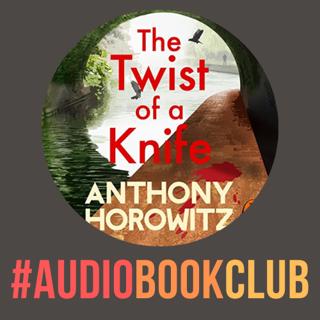
'The Twist of a Knife' - by Anthony Horowitz
On the latest episode of #AudioBookClub - the audiobook review and recommendation podcast - Steve and Matthew discuss 'The Twist of a Knife' - the fourth in Anthony Horowitz's Horowitz and Hawthorne whodunnits The Twist of a Knife Written by Anthony Horowitz 'Performed' (not read) by Rory Kinnear Published by Penguin Audio - 2022 Clocks in at 8 hours and 31 minutes
7 Syys 202227min

'Touch the Top of the World' - by Erik Weihenmayer
On the latest episode of #AudioBookClub - an interactive audiobook review and recommendation podcast - Steve and Matthew discuss 'Touch the Top of the World' an autobiography from Erik Weihenmayer who was the first blind person to climb to the top of Mount Everest. This gives Steve a chance to ask Matthew about his day job at Vision Australia Radio. In their new 'Notes from the Margin' section - the bit that's about audiobooks in general - Steve and Matthew continue their conversation about giving audiobooks as gifts and ask "Is it better to give or to receive?" -- Touch the Top of the World: A Blind Man's Journey to Climb Farther Than the Eye Can See By: Erik Weihenmayer Narrated by: Nick Sullivan Publisher: Blackstone Audio, Inc. Length: 11 hrs and 18 mins COMING UP: 4th September 2022 - Fibber in the Heat by Miles Jupp 11th September 2022 - NOFX: 'The Hepatitis Bathtub and Other Stories' by NOFX, Jello Biafra, et al.
29 Elo 202243min

'The Lazarus Heist' - with Geoff White
On this episode of #AudioBookClub - no longer the world's only interactive audiobook review and recommendation podcast - Steve and Matthew speak to journalist and author Geoff White about his new audiobook 'The Lazarus Heist'. The book is based on the BBC's award winning podcast series of the same name and, in both formats, Geoff tells the story of the Lazarus Group - an elite group of North Korean government-backed hackers. This is the first time we've encountered an audiobook based on a podcast series, so we ask ourselves and Geoff what the difference between the two formats is, both for him as an author/journalist/presenter and for us as listeners. We also touch upon the differences between working for the BBC and for a publishing company like Penguin; and Geoff reminds us that while we haven't necessarily seen many visible signs of any cyber fallout from the war in Ukraine, there is a lot of defensive effort being undertaken in places like GCHQ and Fort Meade. -- Get involved in the conversation. Make your views known! In the #AudioBookClub forums - https://www.audiobookclub.net/forum/discuss-audiobooks/the-sandman On our facebook page - https://www.facebook.com/AnAudioBookClub Or use the hashtag #AudioBookClub On Instagram - https://www.instagram.com/audiobookshow/ Or on twitter - https://twitter.com/stevekphillips https://twitter.com/whingeingpom
20 Elo 202242min

'A Book of Secrets' by Derren Brown
Steve Phillips and Matthew Layton present #AudioBookClub - the interactive audiobook review and recommendation podcast. On this episode we'll be reviewing 'A Book of Secrets; Finding Solace in a Stubborn World' the latest in a series of anti-self-help books from TV mentalist Derren Brown. On an equally philosophical but entirely different level, we'll also be looking into the process of buying someone an audiobook as a present. Not as tangible for either party as the gift of an old-fashioned three dimensional 'atoms and molecules' book, but is it satisfying - both to give and to receive.
15 Elo 20221h 3min

#AudioBookClub :: The Sandman: Act II - with Dirk Maggs
Steve Phillips and Matthew Layton present #AudioBookClub - the world's only interactive audiobook review and recommendation podcast. On this very special episode of #AudioBookClub, Steve and Matthew speak to the man they're not afraid to call 'The Greatest Audiobook Producer In The World" His name is Dirk Maggs and he's the man fully responsible for the conversion of Neil Gaiman's 'The Sandman' from the original graphic novels into the genre-redefining audiobook series we know and love. Dirk was incredibly generous with his time and gave us insights into all the stages of the production process: writing; casting; 'pushing actors about in a studio' and (Steve's favourite part) making the squishy sound effects. Please show your appreciation for Dirk's genius in the comments below. -- "The Sandman: Act 2" - based on the DC Comics series written by Neil Gaiman. Dramatised and produced by Dirk Maggs Full cast recording featuring: Neil Gaiman, James McAvoy, Joe Pasquale, Kat Dennings, Brian Cox, Joanna Lumley... Publisher: Audible Originals AUS: https://amzn.to/3y52vXy CAN: https://amzn.to/3EFpaMq UK: https://amzn.to/3GotakY US: https://amzn.to/3rUnPy1 -- Get involved in the conversation. Make your views known! Use the hashtag #AudioBookClub On Instagram - https://www.instagram.com/audiobookshow/ Or on twitter - https://twitter.com/stevekphillips and https://twitter.com/whingeingpom [The Audible links above are Amazon affiliate links. If you happen to sign up for Audible or renew your subscription after clicking on one of them, #AudioBookClub may or may not be awarded a bounty of some sort. Thank you for your support!]
1 Touko 20221h 3min





